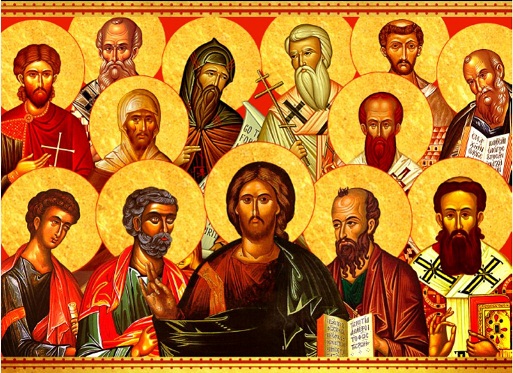"The decline of the knowledge and study of patristics in the present generation of theologians threatens to become catastrophic for our theology unless it is somehow checked. A church without patristics becomes a sect." -Herman Sasse
After going through my studies of who the church fathers are here, here is the list of writings that I came up with. I am going to mark off the ones I read in bold to keep track of them.
The Shepherd of Hermas
The Didache
Epistle of Clement (1 Clement)
Polycarp's Letter to the Philippians
The Martyrdom of Polycarp
The Letters of Ignatius of Antioch
Homilies of John Chrysostom
On the Holy Spirit -Basil
Refutation of the Apology of the Impious Eunomius -Basil
On the Incarnation -Athenasius
Against the Gentiles -Athenasius
Against the Arians -Athenasius
Life of Antony -Athenasius
Letters to Serapian -Athenasius
Confessions -Augustine
City of God -Augustine
On Christian Doctrine -Augustine
On the Trinity -Augustine
On Free Choice of the Will -Augustine
De fide ad Gratianum Augustum (On Faith, to Gratian Augustus) -Ambrose
De Officiis Ministrorum (On the Offices of Ministers) -Ambrose
De Spiritu Sancto (On the Holy Ghost) -Ambrose
De incarnationis Dominicae sacramento (On the Sacrament of the Incarnation) -Ambrose
De mysteriis (On the Mysteries) -Ambrose
Letters against Palagianism and Nestorianism -Jerome of Stridonium
? -Gregory the Great
? -Gregory Nazianzus
Against Heresies -Irenaeus
Against Eunomius -Gregory of Nyssa
Treatise on the Work of the Six Days -Gregory of Nyssa
On the Endowment of Man -Gregory of Nyssa
Life of Moses -Gregory of Nyssa
Great Catechism -Gregory of Nyssa
Becoming Temples of God -Cyril of Alexandria
Second Epistle of Cyril to Nestorius -Cyril of Alexandria
Third Epistle of Cyril to Nestorius (containing the twelve anathemas) -Cyril of Alexandria
The 'Formula of Reunion' between Cyril and John of Antioch -Cyril of Alexandria
Five tomes against Nestorius -Cyril of Alexandria
That Christ is One -Cyril of Alexandria
Scholia on the incarnation of the Only-Begotten -Cyril of Alexandria
Against Julian the Apostate -Cyril of Alexandria
Fountain of Knowledge or The Fountain of Wisdom -John of Damascus
Against the Jacobites -John of Damascus
Against the Nestorians -John of Damascus
Dialogue against the Manichees -John of Damascus
Elementary Introduction into Dogmas -John of Damascus
Letter on the Thrice-Holy Hymn -John of Damascus
On Right Thinking -John of Damascus
On the Faith, Against the Nestorians -John of Damascus
On the Two Wills in Christ (Against the Monothelites) -John of Damascus
On Dragons and Ghosts -John of Damascus
Ad Donatum -Cyprian of Carthage
De Unitate Ecclesiae -Cyprian of Carthage
De Trinitate -Hilary of Poitiers
De Synodis -Hilary of Poitiers








